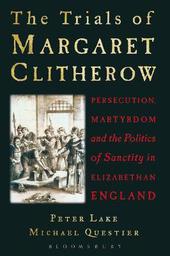
|
The Trials of Margaret Clitherow: Persecution, Martyrdom and the Politics of Sanctity in Elizabethan England
Hardback
Main Details
| Title |
The Trials of Margaret Clitherow: Persecution, Martyrdom and the Politics of Sanctity in Elizabethan England
|
| Authors and Contributors |
By (author) Professor Peter Lake
|
|
By (author) Professor Michael Questier
|
| Physical Properties |
| Format:Hardback | | Pages:272 | | Dimensions(mm): Height 234,Width 156 |
|
| Category/Genre | British and Irish History
History of religion |
|---|
| ISBN/Barcode |
9781441151346
|
| Classifications | Dewey:272.7092 |
|---|
| Audience | | Professional & Vocational | |
|---|
| Illustrations |
23
|
|
Publishing Details |
| Publisher |
Continuum Publishing Corporation
|
| Imprint |
Continuum Publishing Corporation
|
| Publication Date |
26 May 2011 |
| Publication Country |
United States
|
Description
New biography of a Catholic martyr exploring the complicated and controversial story of her demise.
Author Biography
Peter Lake is University Distinguished Professor of History and Professor of the History of Christianity, Divinity School at Vanderbilt University, USA. From 1993-2009 he was Professor of History at Princeton University, USA. He is the author of many books including The Boxmaker's Revenge and a forthcoming volume on Shakespeare's history plays. Michael Questier is Professor of Early Modern History at Queen Mary, University of London, UK. He is the author of Catholicism and Community in Early Modern England (CUP), Conversion, Politics and Religion in England 1580-1625 (CUP), and co-authored with Peter Lake The Antichrist's Lewd Hat: Protestants, Papists and Players in Post-Reformation England (Yale).
Reviews'The authors do a superb job of analysing these fault line. They take the time to place Clitherow's story in the context of her family life and political events but they are not afraid of drawing broader conclusions. In their hands Clitherow's sorry tale reasserts itself as one of the most important prisms through which to view the puzzling internecine struggles of Elizabethan Catholicism as well as the contours of early-modern martyrdom. We'll continue to argue about Clitherow; was she saintly or stubborn? The best place to begin any study of this conundrum is this outstanding book.' -- BBC History Magazine 'The narrative is detailed and intriguing, because Lake and Questier have turned up a wealth of new evidence to defend their case. Thanks to this, we enter the world of Elizabethan religious politics in all its intensity. Who are the heroes and who the villains? The scholarly debate is advanced by this book, and is set to run still further.' -- The Church Times 'It is not a work about a saint so much as a very skilfully argued analysis of religious politics... This book exposes not sanctity so much as the confusion, conflict and misery of a beleaguered minority, and the damage wrought by political imperatives on quiet faith.' -- The Tablet ...it seethes with passion: that of the men and women who killed and were killed and of the authors in unearthing the murky realities behind the life and death of a Catholic icon. -- Literary Review [a] lively new book... [the authors's] sensible approach is to devote short chapters to each particular grouping of issues... there are compelling ideas at play here... while this is a work that will resonate with Tudor historians, it is as interesting to a lay reader both for its historiographic approach and how it traces the workings of the polity. -- The Times Higher Education Supplement Learned but well written and accessible, this book succeeds in bringing back some of the excitement and danger to the debates... The Trials of Margaret Clitherow is a book that needs to be read. If one wants a real idea of what was going on among Catholics at the time, then drop the sickly sweet hagiographies and read this excellent effort. -- The Catholic Times ... a major achievement. It transforms current interpretations of the bitter inter- and inter-confessional disputes engendered by the English Reformation illuminates the ideological struggles through which recusancy became the defining hallmark of early modern Catholic identity... -- The Times Literary Supplement ... an interesting addition to the historical canon that shows the so-called "Golden Age" was in fact heavily characterised by a frenzy of persecution. -- The Catholic Herald Here [the authors] have produced a fluent text which shows no signs of its double authorship, reading as if by a single pair of hands... What [they] very successfully do is to place the case of Margaret Clitherow within the context of recent research and consequent historical debate about the identity and evolution of Early Modern Catholicism in the peculiar circumstances of an England only uncertainly becoming 'Protestant'. -- Northern History, XLIX (1)
|